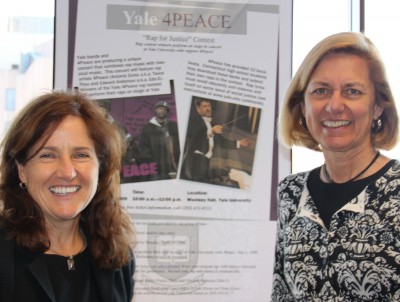
Assistant U.S. Attorney Felice Duffy ’82 (CLAS), ’86 ED, ’91 Ph.D., who has found her way from a UConn soccer field to a federal courtroom, says prosecuting criminals is like playing team sports.
Ethics and integrity must be present in both, she points out. In court and on the field, prosecutors and athletes alike must perform well without breaking rules. Both need to prepare for their challenge but also must react quickly to the unexpected. And a referee/judge is there to help them play by the rules.
“My job is very much like athletics to me when I’m in court,” Felice says. “You have to be mentally agile. You’re on, it’s important, and in both you want to win. In my job as a prosecutor, however, the desired result is not a winning score; rather, it’s the implementation of justice.”
A women’s soccer pioneer in her college days, Felice is a criminal federal prosecutor in the U.S. attorney’s office in New Haven. She spent her first year prosecuting gun and drug trafficking violations and has since transitioned to major crimes and national security.
Felice is also active in crime prevention and helping former prisoners avoid reincarceration. She works with various community groups to inform and educate. The focus of her recent outreach efforts has been helping women avoid involvement in crimes committed by their husbands or boyfriends, and she was part of a group that created a 30-minute docudrama on the subject.
Filmed in a New Haven neighborhood, the docudrama features a scenario in which a woman helps a man she loves cover up a shooting. More than 100 young people auditioned for a role in the film, which also features federal judges and prosecutors.
The film is being shown at schools, detention centers, and various community venues. “The goal is to raise awareness and bring these issues into the forefront,” she explains. “It’s very feel-good work when you can make a positive impact on someone’s life.”
Felice made a positive impact starting with her time at UConn, where she filed a Title IX gender discrimination complaint which led the University to form a women’s soccer team in 1979 that has become a national contender. She was named All-American in her senior year and has been inducted into the Connecticut Soccer Hall of Fame.
After UConn, Felice played soccer on a national level, coached women’s soccer at Yale University, and graduated first in her class at Quinnipiac University’s law school. “I’ve always been a civil rights activist,” she says. “At UConn, everyone would tell me I should be a lawyer because I liked to argue. What I do now, as an advocate for a safer and fairer society, is extremely fulfilling.”
 Facebook
Facebook
 Twitter
Twitter
 LinkedIn
LinkedIn
